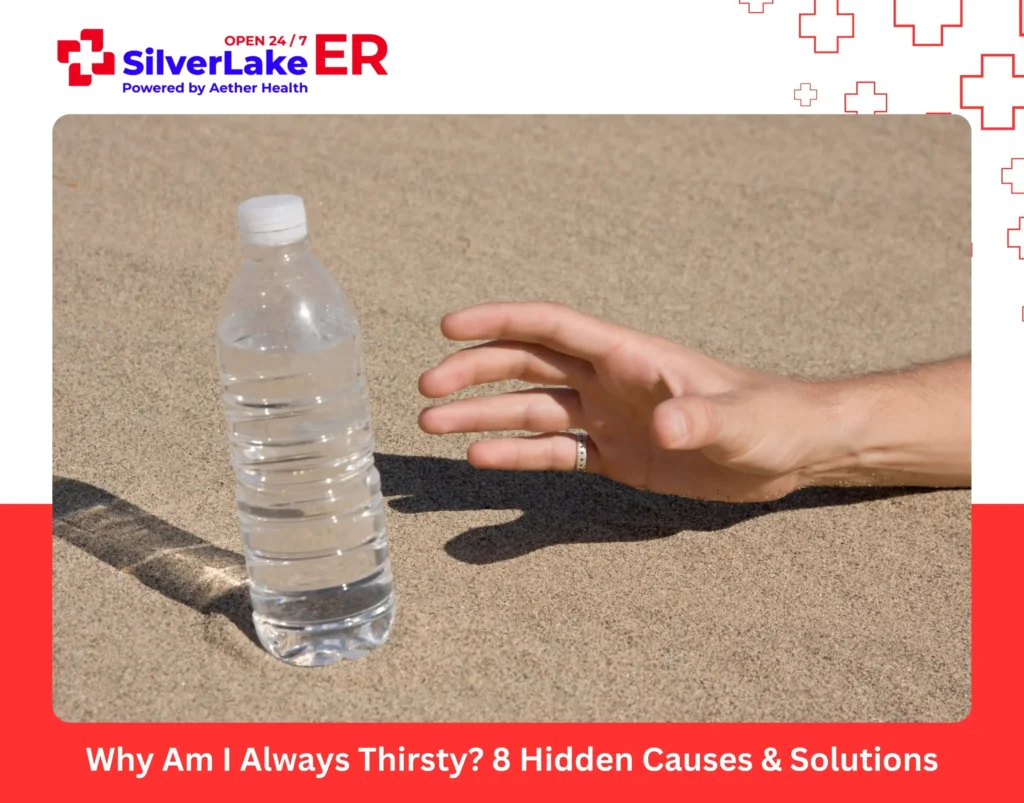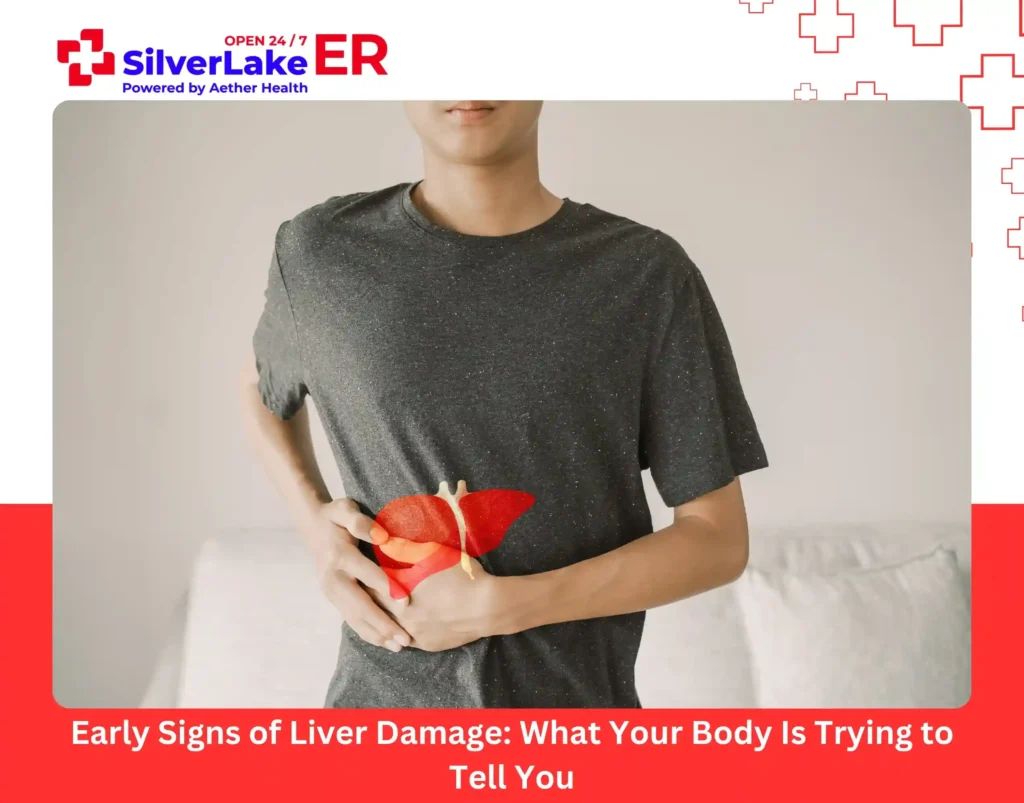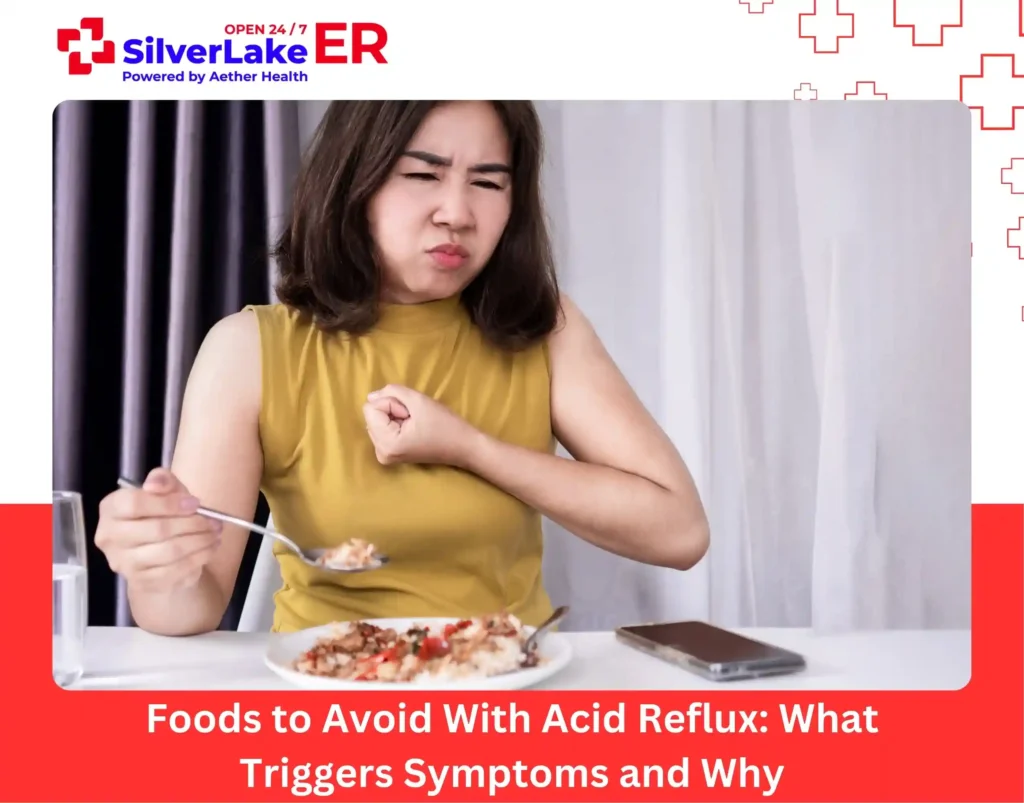Ever find yourself constantly reaching for water, no matter how much you drink? While normal thirst after exercise or salty meals makes sense, persistent thirst, or polydipsia, that won’t go away often signals something more serious.
Excessive thirst causes range from simple dehydration to conditions like diabetes or anemia. Your body uses thirst as an early warning when blood sugar rises, fluid balance shifts, or organs struggle to function properly.
Let’s explore the causes of excessive thirst and know when to try home remedies versus when to seek medical care.
8 Causes of Excessive Thirst
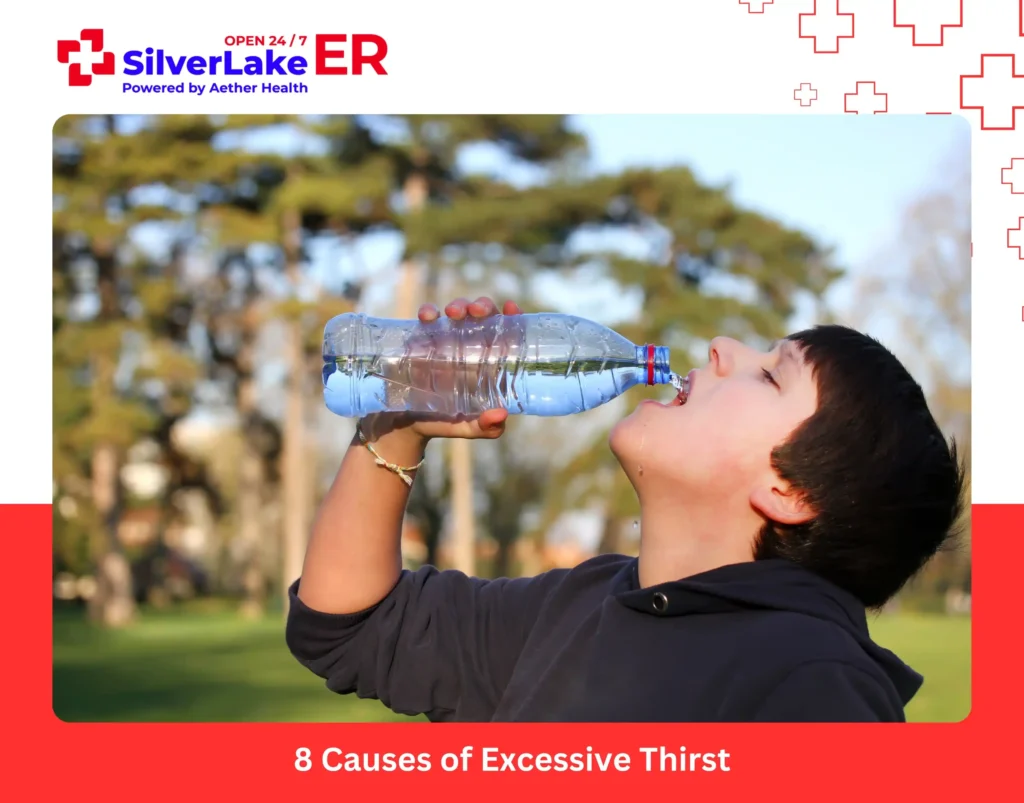
Most excessive thirst causes are manageable with simple lifestyle adjustments, though some signal serious health conditions requiring medical attention:
1. Not Drinking Enough Water
During busy days, you may simply forget to drink adequate fluids. Your body responds with thirst signals to remind you to hydrate, especially when daily water intake falls below recommended levels.
2. Salty or Spicy Food
Chips, fast food, and spicy meals draw water from your cells to balance sodium levels. This cellular dehydration triggers thirst as your body attempts to compensate for the fluid loss.
3. Hot Weather or Physical Activity
Your body naturally sweats more when it’s hot outside or after engaging in physical tasks like running, walking, or working out. Since you lose water when you sweat, it’s normal to feel thirsty as your body tries to replace lost water and maintain proper hydration.
4. Drinking Too Much Caffeine or Alcohol
Coffee, tea, energy drinks, and alcohol act as diuretics, increasing urination and fluid loss. Excessive consumption creates a cycle of dehydration and leaves you in need of more water.
5. Dry Mouth
Mouth breathing during sleep, smoking, or certain medications cause oral dryness that mimics thirst. This sensation occurs without actual dehydration but still triggers the urge to drink.
6. High Blood Sugar (Diabetes Warning Sign)
Constant thirst can also be a sign of elevated blood sugar levels or diabetes. When accompanied by fatigue, frequent urination, or unexplained weight loss, it’s a good idea to have your blood sugar levels checked.
7. Anaemia
Low oxygen levels force your heart and other organs to work harder to function properly. As a response, your body needs more fluids to help improve blood flow and circulation. Some people also experience high blood pressure that causes additional symptoms requiring medical evaluation.
8. High-Protein Diet
Protein metabolism produces waste products that require extra water for elimination. Similarly, low-carb diets also cause initial water weight loss, increasing the feeling of thirst. If you’re on a high-protein or low-carb diet, be sure to drink plenty of water throughout the day to stay hydrated and avoid dehydration.
Excessive Thirst During Pregnancy: What’s Normal?
Pregnancy naturally makes you thirstier as your body works overtime to support both you and your growing baby. Most expectant mothers need about 2-3 extra glasses of water daily.
Early pregnancy thirst often comes from morning sickness leaving you dehydrated, while later pregnancy demands more fluids for increased blood flow and amniotic fluid. This gradual increase in thirst is completely normal and should improve when you drink more water.
However, watch for warning signs of gestational diabetes: extreme thirst that water doesn’t satisfy, frequent bathroom trips, unusual exhaustion, or sudden sugar cravings. These symptoms typically appear between 24-28 weeks and need immediate attention.
Don’t hesitate to call your doctor if thirst feels overwhelming, drinking more water doesn’t help, or you develop blurred vision or frequent infections. Severe morning sickness complications like blood in vomit during pregnancy also require immediate medical evaluation alongside thirst patterns.
Simple Remedies to Manage Constant Thirst
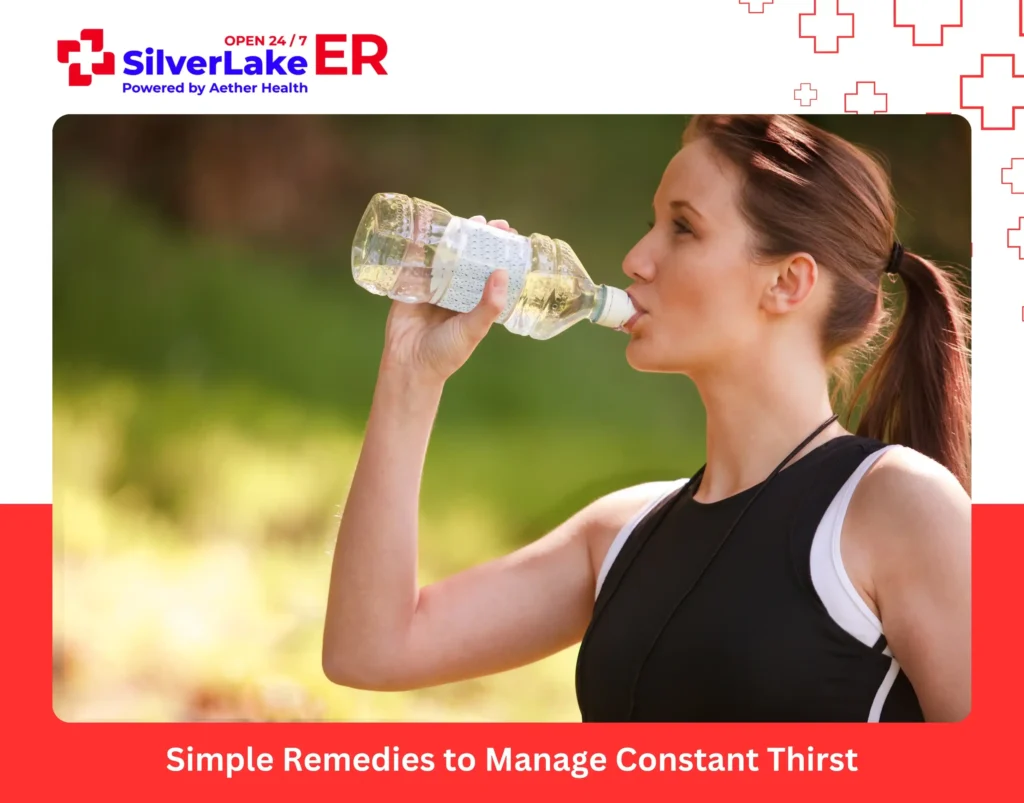
Most excessive thirst causes respond well to simple lifestyle adjustments when underlying medical conditions aren’t involved:
- Drink Water Consistently: Sip small amounts throughout the day rather than large quantities at once. Severe dehydration can also trigger nausea alongside excessive thirst, creating a cycle that worsens without proper treatment.
- Reduce sodium intake: Limit processed foods, chips, and restaurant meals high in salt. When eating spicy foods, increase water intake to compensate for additional fluid needs.
- Choose hydrating foods: Include water-rich options like cucumbers, watermelon, oranges, and leafy greens to boost overall fluid intake naturally.
- Limit diuretic beverages: Replace excessive coffee, tea, and alcohol with herbal teas or fruit-infused water to prevent dehydration cycles.
- Control your environment: Use humidifiers in dry climates or air-conditioned spaces. Stay cool during hot weather to minimize fluid loss through sweating.
- Monitor medication effects: Some prescriptions cause dry mouth or increased urination. Discuss alternatives with your doctor if medications worsen thirst.
These remedies work best for lifestyle-related thirst. However, severe dehydration requires medical intervention, so recognize when to go to the ER for dehydration before symptoms become dangerous.
When to See a Doctor for Excessive Thirst
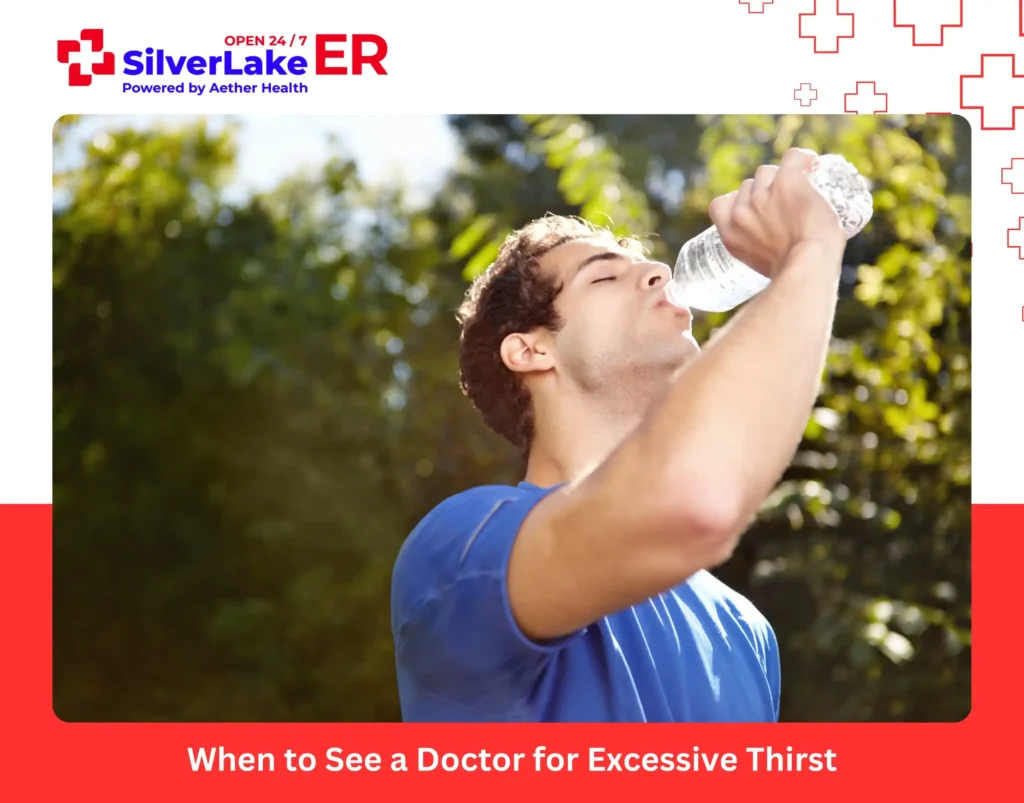
While lifestyle factors often explain persistent thirst, certain symptoms require medical attention:
- Persistent thirst that doesn’t go away with fluid intake
- Peeing more than usual
- Thirst accompanied by extreme fatigue
- Unexplained weight loss despite normal appetite
- Thirst with pale skin, weakness, or shortness of breath
Take Control of Excessive Thirst
Understanding excessive thirst causes empowers you to respond appropriately when symptoms develop. Simple lifestyle adjustments resolve most cases effectively.
However, persistent thirst accompanied by fatigue, frequent urination, or unexplained weight changes requires prompt medical attention. These combinations often signal diabetes, anemia, or other treatable conditions that worsen without intervention.
Trust your instincts. When thirst feels different from normal hydration needs, get checked for accurate diagnosis and appropriate treatment.
FAQs: Excessive Thirst Causes
1. How much water should I drink each day to stay hydrated?
Most people need approximately 6 to 8 glasses (around 1.5 to 2 liters) of fluids per day, but this can vary depending on your activity level, weather conditions, and body size. Therefore, it is best to listen to your body.
2. Why am I still thirsty after drinking water?
Persistent thirst after drinking water may indicate diabetes, medication side effects, or eating too much salt. If this continues for several days, consult your healthcare provider.
3. What medications commonly cause excessive thirst?
Antihistamines, antidepressants, blood pressure medications, and diuretics frequently cause thirst or dry mouth. Always discuss medication side effects with your doctor or pharmacist.
4. Is excessive thirst always a sign of diabetes?
No. While diabetes commonly causes excessive thirst, other causes include dehydration, medications, high-sodium diets, and anemia. Diabetes typically includes frequent urination and unexplained weight loss.
5. Can stress or anxiety cause excessive thirst?
Yes. Stress affects hormone levels and can increase thirst. Anxiety may also cause dry mouth, making you feel thirsty even when adequately hydrated.
6. Why do I wake up thirsty every night?
Nighttime thirst often results from mouth breathing, dry air, medications, or eating salty foods before bed. Persistent nighttime thirst may indicate diabetes or sleep disorders.
7. How quickly should excessive thirst improve with lifestyle changes?
Most lifestyle-related thirst improves within 2-3 days of increasing water intake and reducing salt. If symptoms persist beyond one week, seek medical evaluation.

